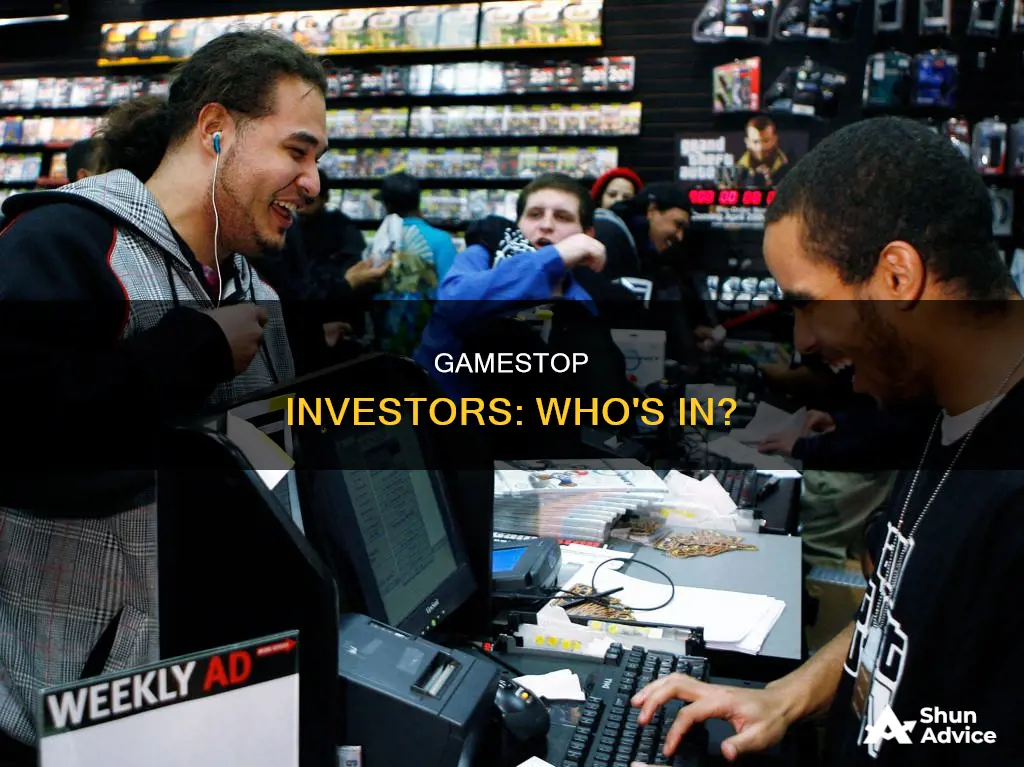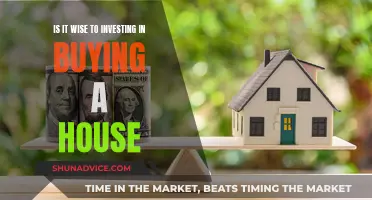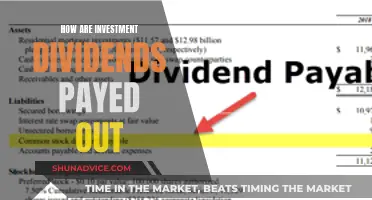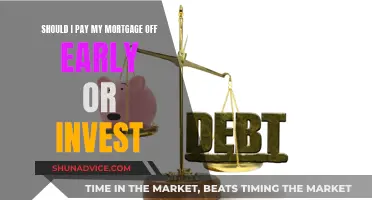
In January 2021, amateur investors on Reddit noticed that the short interest in GameStop exceeded 100%. This led to a surge in the company's stock price, which skyrocketed from $17.25 to over $500 per share. The exact number of people who invested in GameStop during this period is unclear, but it is estimated that millions of people participated in the rally. Many of these investors were individual retail traders who coordinated their efforts on the subreddit r/wallstreetbets. The phenomenon sparked a national conversation about access to financial markets and led to hearings in the U.S. Congress. While some investors made significant gains, others lost money, highlighting the risks associated with speculative investing.
| Characteristics | Values |
|---|---|
| Date of Investment | Amount of Investment |
| Early January 2021 | $19.94 per share |
| Jan 13, 2021 | $31.40 per share |
| Jan 22, 2021 | $65 per share |
| Jan 28, 2021 (Intraday) | $483 per share |
| Jan 28, 2021 (Close) | $193.60 per share |
| Feb 11, 2021 | $51 per share |
| March 22, 2023 | $24.53 per share |
What You'll Learn
- How much money could have been made from investing $1,000 in GameStop stock during the 2021 rally?
- The role of subreddit r/wallstreetbets in the GameStop short squeeze
- The impact of the short squeeze on hedge funds and short sellers
- The regulatory response to the GameStop short squeeze
- The effect of the short squeeze on the company's ranking on the Fortune 500

How much money could have been made from investing $1,000 in GameStop stock during the 2021 rally
The amount of money that could have been made from investing $1,000 in GameStop stock during the 2021 rally would depend on when the investment was made and when it was sold.
If an investor bought $1,000 worth of GameStop shares in early January 2021 at $19.94 each, they would have seen a 446% return on their investment, and their $1,000 would have become $5,461.
However, if an investor bought at the peak of the frenzy, they would have lost a significant chunk of their money. For example, if an investor bought $1,000 worth of shares at the stock's all-time high of $483 on January 28, 2021, their investment would have lost 77.5% of its value by January 18, 2022, leaving them with $225.71.
Even if an investor had waited for the shares to crash after the all-time high, they still would have lost money. A $1,000 investment at the closing price on January 28, 2021, of $193.60 would have lost just under 50% of its value and would have been worth $562.55 a year later.
On the other hand, if an investor had bought $1,000 worth of GameStop shares at $18.61 on September 15, 2023 (the date of the theatrical release of "Dumb Money," a movie inspired by the GameStop story), their investment would have been worth $1,687.12 on July 1, 2024, an increase of 68.7%.
Investing in Others: A Worthy Bet
You may want to see also

The role of subreddit r/wallstreetbets in the GameStop short squeeze
The subreddit r/wallstreetbets played a major role in the GameStop short squeeze, which caused losses for some US firms and short sellers in early 2021.
R/wallstreetbets is an online community on Reddit, a social news website. The community is known for its discussion of meme stocks and high-risk stock transactions. Members of the subreddit are often young retail traders and investors who ignore fundamental investment practices and risk management techniques, so their activities are often considered a form of gambling.
In the case of GameStop, r/wallstreetbets users believed the company was being significantly undervalued, and with a large amount of the stock being shorted, they saw an opportunity to trigger a short squeeze by driving up the price and forcing short sellers to buy back shares at a loss.
On January 22, 2021, users of r/wallstreetbets initiated a short squeeze on GameStop, pushing their stock prices up significantly. This occurred shortly after a comment from Citron Research predicting that the value of the stock would decrease. The stock price had increased by more than 600% by January 26, and its high volatility caused trading to be halted multiple times.
A series of posts by user u/DeepFuckingValue on the subreddit helped to generate interest in the stock. On January 27, 2021, the r/wallstreetbets subreddit received 73 million page views in 24 hours, breaking all-time traffic records. The community surged by 1.5 million users overnight to a total of 6 million users, making it the fastest-growing subreddit at the time.
The role of r/wallstreetbets in the GameStop short squeeze attracted a lot of attention from the media, financial stakeholders, and the academic community. It has been described as a David vs. Goliath story, where individual investors were able to take on and defeat major hedge funds. The event also raised questions about market manipulation and regulatory scrutiny, with dozens of class-action lawsuits being filed and congressional hearings being held to discuss the incident.
Amer Sports: Who Invests?
You may want to see also

The impact of the short squeeze on hedge funds and short sellers
The short squeeze on GameStop's stock had a significant impact on hedge funds and short sellers, causing major financial losses and market disruption. Here is an analysis of its effects:
Impact on Hedge Funds:
The short squeeze resulted in substantial financial losses for hedge funds that had shorted GameStop's stock. As the stock price surged, hedge funds were forced to buy back shares at a much higher price to cover their short positions, leading to significant losses. This was particularly notable for hedge funds that had heavily shorted the stock, expecting it to decline. The losses incurred by hedge funds contributed to the overall market volatility and uncertainty during the short squeeze.
Impact on Short Sellers:
Short sellers, including individual investors and institutional investors, faced significant financial losses as the stock price skyrocketed. Many short sellers had to buy back shares at a much higher price to limit their losses, resulting in substantial negative returns. The short squeeze also disrupted the trading strategies of short sellers, as they had to adjust their positions and exit trades prematurely to minimize further losses. This disruption in trading strategies and the magnitude of financial losses had a considerable impact on short sellers' portfolios and investment plans.
Market-Wide Effects:
The GameStop short squeeze had broader implications for the financial markets. It highlighted the risks associated with short selling and the potential for retail investors to coordinate their actions and influence stock prices. The event also led to increased regulatory scrutiny and discussions about potential changes in short-selling regulations. Additionally, the short squeeze contributed to a broader discussion about the power dynamics between retail investors and institutional investors, and the role of social media in driving market trends. The impact of the GameStop short squeeze extended beyond the company itself, affecting various other heavily shorted stocks and even some cryptocurrencies.
In summary, the GameStop short squeeze had a significant impact on hedge funds and short sellers, resulting in financial losses and market disruptions. It also brought attention to the strategies employed by short sellers and the potential for coordinated action by retail investors to influence stock prices. The event had far-reaching consequences and sparked discussions about the regulatory framework surrounding short selling and the evolving nature of financial markets.
BlackRock: Investors' Choice
You may want to see also

The regulatory response to the GameStop short squeeze
The House Financial Services Committee and the Senate Banking Committee also announced plans to hold hearings on the matter, with a focus on short selling, online trading platforms, and their impact on retail investors and the broader markets. Lawmakers from both parties, including Representative Alexandria Ocasio-Cortez and Senator Ted Cruz, called for investigations into Robinhood's decision to restrict trading.
State-level regulators also took action, with the attorneys general of Texas and New York launching probes into Robinhood's trading restrictions. The Texas Attorney General's office issued civil investigative demands, while the New York Attorney General's office announced an inquiry into the matter.
In addition to the regulatory response, the GameStop short squeeze also led to a wave of litigation, with dozens of lawsuits filed against Robinhood and other trading platforms. These lawsuits alleged breaches of contract, breaches of fiduciary duty, negligence, and market manipulation. While legal experts believed that many of these lawsuits would not succeed, the incident highlighted the need for clear and robust regulations governing the complex and evolving landscape of online trading and short selling.
Investing in People: A Risky Business
You may want to see also

The effect of the short squeeze on the company's ranking on the Fortune 500
In 2020, GameStop was ranked 464th on the Fortune 500 list of the largest US companies by revenue. This was a significant drop from its ranking of 255th in 2010. The company's revenue in 2020 was $6.4 billion, but it reported a loss of $470 million. As of 2020, GameStop had 30,000 employees and operated more than 5,500 stores in 14 countries.
The short squeeze in January 2021 caused by retail investors on Reddit resulted in a surge in GameStop's stock price, which reached a pre-market value of over $500 per share on January 28. This surge in stock price had a significant impact on GameStop's ranking on the Fortune 500 list. While the exact ranking for 2021 is not yet available, it is likely that GameStop's position improved due to the increased revenue generated during this period.
However, it is important to note that the short squeeze also resulted in significant losses for short sellers and hedge funds. The high stock price was not sustainable, and GameStop's stock price fell to $120.34 per share on March 24, 2021, after the company announced plans for a new secondary stock offering. This volatility and the overall decline in GameStop's business may have negatively affected its ranking on the Fortune 500 list in subsequent years.
By March 2023, GameStop's prospects were still uncertain, with analysts predicting losses for the company in fiscal 2024. The company's stock was no longer part of the S&P 500, and it had become one of the worst-performing stocks in the S&P 1500, ranking 500th worst over the past year.
FTX Investors: Who Got Hurt?
You may want to see also
Frequently asked questions
It is unclear exactly how many people invested in GameStop. However, the number of investors was large enough to cause a short squeeze of the stock, which resulted in major financial consequences for certain hedge funds and large losses for short sellers.
A short squeeze occurs when a stock that has been heavily shorted—that is, when investors borrow shares and immediately sell them in the hope of buying them back later at a lower price—suddenly jumps in value, forcing short sellers to buy back the stock at a loss.
The GameStop short squeeze caused major financial consequences for certain hedge funds and large losses for short sellers. The price of the stock rose from less than $20 per share to more than $400, and popular investing apps like Robinhood had to pause trading. Dozens of class-action lawsuits were filed against Robinhood, and the U.S. House Committee on Financial Services held a congressional hearing on the incident.







